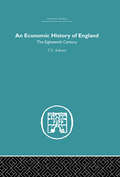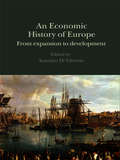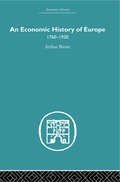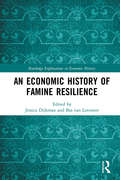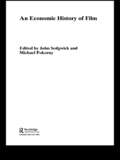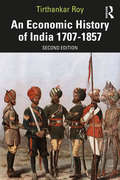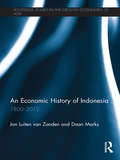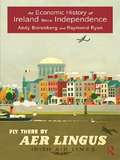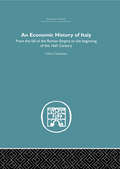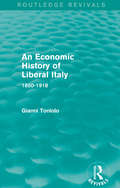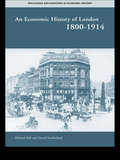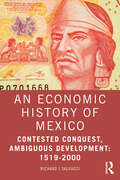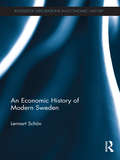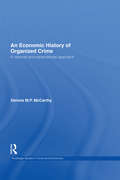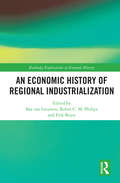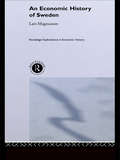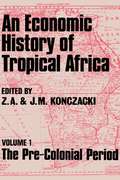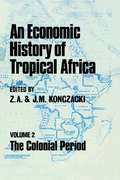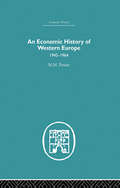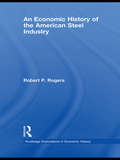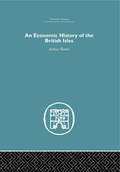- Table View
- List View
An Economic History of England: The Eighteenth Century
by T.S. AshtonT.S. Ashton has sought less to cover the field of economic history in detail than to offer a commentary, with a stress on trends of development rather than on forms of organization or economic legislation. This book seeks to interpret the growth of population, agriculture, maufacture, trade and finance in eighteenth-century England. It throws light on economic fluctuations and on the changing conditions of the wage-earners. The approach is that of an economist and use is made of hitherto neglected statistics. But treatment and language are simple. The book is intended not only for the specialist but also for others who turn to the past for its own sake or for understanding the present. This book was first published in 1955.
An Economic History of Europe
by Antonio Di VittorioAn Economic History of Europe provides students with a comprehensive introduction to European economic history from the fifteenth century to the present day. Individual chapters offer brief references to previous historical periods and events, with special attention given to core themes concerning economic development, and an analysis of their change through time and space. Core themes examined in each period include: the increasing prominence of industry international trade demand and supply dynamics agriculture. The unique structure of this text enables students not only to gain a firm grounding in the long-term evolution of the European economy, but also provides an historical overview of the economic development of individual countries. Individual contributors analyze the shift from the modern to the contemporary period and offer a broad explanation of the historical roots of the problems that face today's economic development. This key text is indispensable reading for students in economics, economic history, development economics and history.
An Economic History of Europe
by Karl Gunnar PerssonThis concise introduction is the only textbook students will need to understand Europe's unique economic development and its global context.
An Economic History of Europe 1760-1930
by a. BirnieA history of the rise of industrialism in modern Europe, containing a description of the revolutionary changes which transformed industry, commerce and agriculture at the beginning of the last century, with an account of their reactions on the political and economic condition of the chief European nations. The social problems created by this momentous revolution are discussed in detail, and a historical survey is given of the various attempts to correct the evils of industrialism, on the one hand through state intervention by means of poor laws, factory laws, schemes of social insurance, etc., and on the other through voluntary effort as manifested in movements like trade unionism, co-operation, profit sharing and co-partnership. Post-war developments such as the Russian Revolution and international labour legislation are also described in detail and depth. This book was first published in 1930.
An Economic History of Famine Resilience (Routledge Explorations in Economic History)
by Bas Van Leeuwen Jessica DijkmanFood crises have always tested societies. This volume discusses societal resilience to food crises, examining the responses and strategies at the societal level that effectively helped individuals and groups to cope with drops in food supply, in various parts of the world over the past two millennia. Societal responses can be coordinated by the state, the market, or civil society. Here it is shown that it was often a combined effort, but that there were significant variations between regions and periods. The long-term, comparative perspective of the volume brings out these variations, explains them, and discusses their effects on societal resilience. This book will be of interest to advanced students and researchers across economic history, institutional economics, social history and development studies.
An Economic History of Film (Routledge Explorations in Economic History #Vol. 26)
by John Sedgwick Michael PokornyThe economics of the movie industry has been curiously neglected by scholars, especially given the material circumstances in which film has been produced, distributed and exhibited in capitalist economies and its central importance in the lives of the huge numbers attracted to it as a commodity. This book provides an economic framework for understanding developments in film history. Film is a peculiar commodity with a unique set of characteristics. The topic hence is interesting and covered with aplomb by the contributors to the volume. The book includes sections on: long-term trends in the film industry the transformation of film from a primitive commodity to a heavily branded product the operation of the studio system the end of the studio system in post-war America the role and payment of stars Hollywood’s approach to risk during the 1990s. Experts from the UK and North America have come together in these pages and the result is a readable, insightful and enlightening book that will gain many fans amongst those with an interest in the economics of film, economic historians, film historians and aficionados of the movie industry generally.
An Economic History of India 1707–1857
by Tirthankar RoyThis new edition of An Economic History of Early Modern India extends the timespan of the analysis to incorporate further research. This allows for a more detailed discussion of the rise of the British Empire in South Asia and gives a fuller context for the historiography. In the years between the death of the emperor Aurangzeb (1707) and the Great Rebellion (1857), the Mughal Empire and the states that rose from its ashes declined in wealth and power, and a British Empire emerged in South Asia. This book asks three key questions about the transition. Why did it happen? What did it mean? How did it shape economic change? The book shows that during these years, a merchant-friendly regime among warlord-ruled states emerged and state structure transformed to allow taxes and military capacity to be held by one central power, the British East India Company. The author demonstrates that the fall of warlord-ruled states and the empowerment of the merchant, in consequence, shaped the course of Indian and world economic history. Reconstructing South Asia’s transition, starting with the Mughal Empire’s collapse and ending with the great rebellion of 1857, this book is the first systematic account of the economic history of early modern India. It is an essential reference for students and scholars of Economics and South Asian History.
An Economic History of India: Growth, Income and Inequalities from the Mughals to the 21st Century (Cambridge Studies in Economic History - Second Series)
by Bishnupriya GuptaThis book offers a major new economic history of India from the reign of Akbar in the sixteenth century to India's post-independence integration into the global economy. Using concepts and theories from economics and economic history alongside extensive new data, Bishnupriya Gupta builds a new framework for understanding the economic impacts and legacies of British rule. She charts India's transition from precolonial economy to colonial rule and evaluates its economic performance from a comparative perspective, particularly in the context of the Great Divergence between Europe and Asia. Finally, she examines India's post-independence economy and the evolution of social and economic inequality through to the turn of the twenty-first century. By taking a long view, the book sheds new light on the persistent effects of historical institutions as well as the impacts of policy-driven changes. It will be essential reading for anyone seeking to understand the long-run evolution of the Indian economy.
An Economic History of Indonesia: 1800-2010 (Routledge Studies in the Growth Economies of Asia)
by Jan Luiten van Zanden Daan MarksBased on new datasets, this book presents an economic history of Indonesia. It analyses the causes of stagnation of growth during the colonial and independence period, making use of new theoretical insights from institutional economics and new growth theory. The book looks at the major themes of Indonesian history: colonial exploitation and the successes and limitations of the post 1900 welfare policies, the price of instability after 1945, and the economic miracle after 1967. The book not only discusses economic change and development – or the lack thereof – but also the institutional and socio-political structures that were behind these changes. It also presents a lot of new data on the changing welfare of the Indonesian population, on income distribution, and on the functioning of markets for rice, credit and labour. Concluding with a discussion on whether the poor profited from the economic changes, this book is a useful contribution to Southeast Asian Studies and International Economics.
An Economic History of Ireland Since Independence (Routledge Studies in the History of Economics)
by Andy Bielenberg Raymond RyanThis book provides a cogent summary of the economic history of the Irish Free State/Republic of Ireland. It takes the Irish story from the 1920s right through to the present, providing an excellent case study of one of many European states which obtained independence during and after the First World War. The book covers the transition to protectionism and import substitution between the 1930s and the 1950s and the second major transition to trade liberalisation from the 1960s. In a wider European context, the Irish experience since EEC entry in 1973 was the most extreme European example of the achievement of industrialisation through foreign direct investment. The eager adoption of successive governments in recent decades of a neo-liberal economic model, more particularly de-regulation in banking and construction, has recently led the Republic of Ireland to the most extreme economic crash of any western society since the Great Depression.
An Economic History of Italy: From the Fall of the Empire to the Beginning of the 16th Century
by Gino LuzzattoThis book is the first to provide English readers with a brief and comprehensive survey of economic life in Italy during the period of its greatest splendour: the Middle Ages and Renaissance. The wealth of Renaissance Italy was the product of centuries of growth, and the great Renaissance cities, Venice, Milan and Florence, were first and foremost centres of international trade, which taught the rest of Europe the rudiments of modern business techniques. In a masterly synthesis, based upon a lifetime of study and research, Professor Gino Luzzatto, the greatest of living Italian historians, describes the main changes in Italian economic conditions from the end of the Roman Empire, when Italy ceased to be the centre of a European state, to the end of the Middle Ages when Italy lost the leadership of European trade and banking. The narrative chapters, which deal with barbarian Italy, feudal Italy and Italy in the age of the communes, are followed by a valuable analysis of medieval agriculture, industry, commerce and finance, in her principal Italian states. The range of discussion is wide and offers an excellent introduction to the economic history not only of Italy but of the whole Mediterranean region. This classic text was first published in 1961.
An Economic History of Liberal Italy: 1850-1918 (Routledge Revivals)
by Gianni TonioloThis book, first published in 1990, examines Italy’s economic history from its Unification in 1850 to the end of the First World War. Particular attention is paid to the extent to which Italy exhibits the features of Kaznets’s model of ‘modern economic growth’. An Economic History of Liberal Italy begins with a quantitative assessment of Italy’s long-term growth in this period. All of the main relevant variables – including production, consumption, investment, foreign trade, government spending, and welfare – are discussed. The book proceeds through a chronological account of the developments of the economy during this period, and concludes with a critical survey of the relevant historiography. Throughout the book emphasis is given to structural changes, to developments in the main industries, to the relations between different sectors of the economy, and to economic policies. This book is ideal for those studying economics of Italian history.
An Economic History of London 1800-1914 (Routledge Explorations In Economic History Ser. #Vol. 22)
by Professor Michael Ball David T SunderlandIn 1800 London was already the largest city in the world, and over the course of the next century its population grew rapidly, reaching over seven million by 1914. Historians have often depicted London after the Industrial Revolution as an industrial backwater that declined into the mass exploitation of labour through 'sweating', dominated by City
An Economic History of Mexico: Contested Conquest, Ambiguous Development: 1519-2000
by Richard J SalvucciAfter a turbulent modern history of conquest and colonialism, Mexico has developed as an economy that may be emerging but still displays significant levels of poverty, particularly in relation to its neighbor to the north, the United States.Drawing on archival data, decades of new Mexican historiography, and considering issues of political economy, this book explores how Mexico ended up in the relative economic position that it did. Beginning with Hernán Cortés and the invention of the Conquest of New Spain, it explores the economic history of Mexico through the lens of political economy, incorporating environment and demography, politics and power, and industrialization and inequality. The aftermath of the Conquest brought about a complete restructuring of the economy as a result of death from disease, the introduction of European-style agriculture, and a more intensive exploitation of the peasantry. The eighteenth and nineteenth centuries saw “reform” followed by a series of crises and rebellions under which sustained economic growth was impossible. Globalization and the expansion of agricultural exports provided some opportunities in the late nineteenth and twentieth centuries, but they failed to provide the booming rural population with a sustainable means of supporting domestic demand. The so-called Mexican Miracle—the period of rapid growth in the 1950s, 1960s, and early 1970s—disguised a failure to address the economic inequality embedded since the colonial period. As this book clearly demonstrates, this inequality was sometimes challenged in Mexican history but never decisively addressed, let alone reversed.This accessible and engaging book is vital reading for students and scholars of the history of Mexico and Latin America and those interested in economic development in historical perspective.
An Economic History of Modern Sweden
by Lennart SchönThe book is based on a rich and detailed quantitative material from research over the past decades with consecutive time series over production volumes, employment, productivity, investments etc. for sectors and branches covering the whole economy, even including estimates of non-marketed domestic work. It is also based on a broad literature from Swedish historiography with details on the individual level of firms, innovators and entrepreneurs. Focus is upon the interplay between technological, economic and social change where a number of broad themes are treated with a general interest to historians or economists, e.g. the role of social change and domestic markets versus international specialisation and exports as dynamic factors in Swedish economic growth.
An Economic History of Organized Crime: A National and Transnational Approach (Routledge Studies In Crime And Economics Ser. #4)
by Dennis M. McCarthyThis book is a comparative study of organized crime groups from five different parts of the world: Europe; North America; Central America/South America/Caribbean basin; Africa; and Asia/Western Pacific. Each part contains two case studies and a shorter essay, a vignette. From Europe the case studies focus on the Italian mafias and the Russian mafia; the vignette, on the Albanian mafia. From North America the case studies highlight the US Mafia and the Mexican drug cartels; the vignette, organized crime in Canada. From Central America/South America/Caribbean basin the case studies concentrate on the Colombian drug cartels and gangs of the Caribbean; the vignette, on organized crime in Cuba. From Africa the case studies examine resource wars and Somali piracy; the vignette, relations among international drugs trafficking, organized crime, and terrorism in North and West Africa. And from Asia/Western Pacific the case studies spotlight the Chinese Triads and Japanese Yakuza; the vignette, relations among international drugs trafficking, organized crime, and terrorism in Afghanistan. Written in non-specialist language, An Economic History of Organized Crime provides an original overview of a crucial problem of our times: the growing scourge of global organized crime. This book can be read with profit by the general public, but it also has value for academic specialists and professionals in law enforcement.
An Economic History of Regional Industrialization (Routledge Explorations in Economic History)
by Bas Van Leeuwen Robin C. M. Philips Erik BuystThis book offers a comprehensive study of regional industrialization in Europe and Asia from the early nineteenth century to the present. Using case studies on regional industrialization, the book provides insights into similarities and differences in industrialization processes between European, Eurasian and Asian countries. Important factors include the transition from traditional to modern industrial production, industrial policy, agglomeration forces, market integration, and the determinants of industrial location over time. The book is an invaluable reference that attempts to bridge the fields of economic history, political history, economic geography, and economics while contributing to the debates on economic divergence between Europe and Asia as well as on the role of economic integration and globalization.
An Economic History of Sweden (Routledge Explorations In Economic History Ser. #Vol. 16)
by Lars MagnussonThis book represents the first recent attempt to provide a comprehensive treatment of Sweden's economic development since the middle of the 18th century. It traces the rapid industrialisation, the political currents and the social ambitions, that transformed Sweden from a backward agrarian economy into what is now regarded by many as a model welfar
An Economic History of Tropical Africa: Volume One : The Pre-Colonial Period
by Z.A. Konczacki J.M. KonczackiThese articles cover: early agricultural development; history of agricultural crops; patterns of land use and tenure; introduction and use of metals; economic and technological aspects of the Iron Age; patterns of trade; trade routes and centres; and media of exchange.
An Economic History of Tropical Africa: Volume Two : The Colonial Period
by Z. A. Konczacki and J. M. KonczackiThese articles cover: early agricultural development; history of agricultural crops; patterns of land use and tenure; introduction and use of metals; economic and technological aspects of the Iron Age; patterns of trade; trade routes and centres; and media of exchange.
An Economic History of Twentieth-Century Europe
by Berend Ivan T.A major history of economic regimes and economic performance throughout the twentieth century. Ivan T. Berend looks at the historic development of the twentieth-century European economy, examining both its failures and its successes in responding to the challenges of this crisis-ridden and troubled but highly successful age. The book surveys the European economy's chronological development, the main factors of economic growth, and the various economic regimes that were invented and introduced in Europe during the twentieth century. Professor Berend shows how the vast disparity between the European regions that had characterized earlier periods gradually began to disappear during the course of the twentieth century as more and more countries reached a more or less similar level of economic development. This accessible book will be required reading for students in European economic history, economics, and modern European history.
An Economic History of Twentieth-Century Europe
by Ivan T. BerendA major new history of economic regimes and economic performance throughout the twentieth century. Ivan T. Berend looks at the historic development of the twentieth-century European economy, examining both its failures and its successes in responding to the challenges of this crisis-ridden and troubled but highly successful age. The book surveys the European economy's chronological development, the main factors of economic growth, and the various economic regimes that were invented and introduced in Europe during the twentieth century. Professor Berend shows how the vast disparity between the European regions that had characterized earlier periods gradually began to disappear during the course of the twentieth century as more and more countries reached a more or less similar level of economic development. This accessible book will be required reading for students in European economic history, economics, and modern European history.
An Economic History of Western Europe 1945-1964 (Economic History Ser.)
by M.M PostanFirst Published in 2005. Routledge is an imprint of Taylor & Francis, an informa company.
An Economic History of the American Steel Industry (Routledge Explorations in Economic History)
by Robert P. RogersThis book provides a basic outline of the history of the American steel industry, a sector of the economy that has been an important part of the industrial system. The book starts with the 1830's, when the American iron and steel industry resembled the traditional iron producing sector that had existed in the old world for centuries, and it ends in 2001. The product of this industry, steel, is an alloy of iron and carbon that has become the most used metal in the world. The very size of the steel industry and its position in the modern economy give it an unusual relevance to the economic, social, and political system.
An Economic History of the British Isles
by Arthur BirnieFirst Published in 2005. Economic History has been briefly defined as the study of material progress. Economic History deals primarily with the material side of human progress, but it is not therefore a materialistic study.
